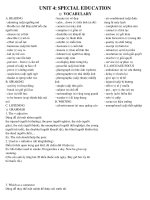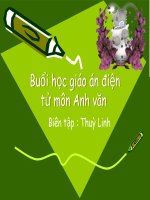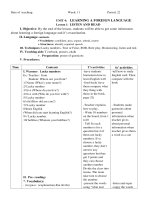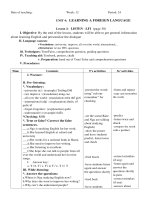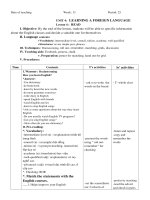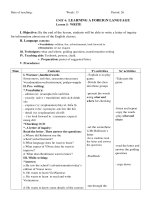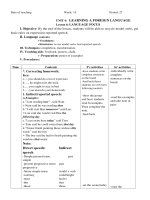E10 UNIT 4: TV, NP, BT
Bạn đang xem bản rút gọn của tài liệu. Xem và tải ngay bản đầy đủ của tài liệu tại đây (101.55 KB, 5 trang )
UNIT 4: SPECIAL EDUCATION
I. VOCABULARY
A. READING (pages 44-45)
admiring (adj) ngưỡng mộ describe (v) mô tả
Braille (n) chữ Bray effort (n) nỗ lực
(chữ nổi cho người mù) chance (n) cơ hội
humorous (adj) hài hước proud of (adj) tự hào về
kid (n) trẻ con infer (v) suy ra
one by one lần lượt prove (v) chứng minh
prevent … from (v) cản trở suspicious (adj) nghi ngờ
thanks to (prep) nhờ vào
B. SPEAKING (pages 47-48)
activity (n) hoạt động to be honest (exp) thành thật mà
nói
break (n) giờ giải lao class (n) tiết học
C. LISTENING (pages 48-49)
beauty (n) vẻ đẹp on display được trưng bày
calm … down (v) have trấn tónh(ai đó) mute (adj)
câm
camera (n) máy ảnh peaceful (adj) hoà bình
comprise (v) gồm có photograph (n) bứcảnh
(=photo)
disability (n) khuyết tật photographer (n) nhà nhiếp ảnh
escape (v) thoát khỏi photographic (adj) (thuộc)nhiếp
ảnh
exhibit (v) triển lãm simple (adj) đơn giản
fascinate (v) cuốn hút subject (n) chủ đề
feature (v) làm nổi bật lên surroundings (v) vùng xung
quanh
labourer (n) người lao động wander (v) đi lang thang
D. WRITING (pages 50-51)
advisement (n) mục quảng cáo quality (n) chất lượng
air-conditioned (adj) được trang bò receipt (n)
biên lai
máy lạnh refund (n) sự trả lại tiền
complaint (n) sự phàn nàn resolution (n) cách giải
quyết
contact (v) liên lạc resolve (v) giải quyết
enclose (v) gởi kèm service (n) sự phục vụ
look forward to (v) mong đợi
E. LANGUAGE FOCUS (pages 52-53)
ambulance (n) xe cứu thương put…up (v) cho (ai) trọ
delay (v) hoãn lại rarely (adv) hiếm khi
give up (v) từ bỏ rob (v) cướp
injured (adj) bò thương scene (n) hiện trường
offer (v) tỏ ý muốn unemployed (adj) thất nghiệp
II. GRAMMAR
1.The + adjective:
Dùng để chỉ một nhóm người: the injured (người bò thương), the poor
(người nghèo), the rich (người giàu), the sick (người bệnh), the
unemployed (người thất nghiệp), the young (người trẻ tuổi), the disabled
(người khuyết tật), the blind (người khiếm thò), the dead (người chết)…
Ex: The rich should help the poor.
2. Used to + infinitive (đã từng/thường)
Diễn tả thói quen trong trong quá khứ, đã chấm dứt ở hiện tại.
Ex: His father used to smoke 10 cigarettes a day. Now he gives
up smoking.
(Cha của anh ấy từng hút 10 điếu thuốc 1 ngày. Bây giờ bác
ấy đã bỏ thuốc rồi.)
3. Which as a connector
Dùng để thay thế một mệnh đề được nói trước đó.
Ex: Mary couldn’t come to the party, which was a pity.
(Mary không thể đến dự tiệc,đó là điều đáng tiếc)
UNIT 4: SPECIAL EDUCATION
EXERCISES
Exercise 1: Choose the word in each group that has the underlined part pronounced differently from
the rest.
1. A. follow B. job C. geography D. develop
2. A. all B. walk C. what D. water
3. A. effort B. world C. sport D. before
4. A. fall B. watch C. bottle D. wrong
5. A. awful B. quality C. corner D. fourteen
Exercise 2: Choose the word in each line that has different stress pattern.
6. A. enjoy B. prevent C. special D. attend
7. A. different B. disabled C. consuming D. activity
8. A. educate B. secondary C. biology D. suspicious
9. A. explain B. gradually C. development D. profession
10. A. opposite B. employed C. condition D. important
Exercise 3: Use The + Adjective from the list to complete each sentence.
disabled, rich, deaf, unemployed, dumb, poor, blind, injured
11. ……………………………..have to help …………………………. .
12. …………….….in the accident yesterday morning was taken to hospital immediately.
13. The little boy is helping ………………………cross the street.
14. …….....…..and…………. use a system of sign language to communicate with each other.
15. The government should take an urgent step to help …………………….. .
16. Don’t make fun of ………………………………….. .
Exercise 4: Choose the correct word between brackets.
17. The rich (is / are ) ………….. not always happy.
18. The poor (is / are )……………not always unhappy.
19. The dead never …………….( return / returns ).
20. The lazy can never …………….( succeeds / succeed ).
21. The young ( have / has ) ……………the future in their hand.
Exercise 5: Use “WHICH” to combine each pair of sentences.
22. John is always late for class. This annoys the teacher.
……………………………………………………………………………..
23. People today put advertisements on TV or in newspapers. This makes it possible to produce
more things to sell.
………………………………………………………………………………
………………………………………………………………………………
24. He passed the exam with high grades. This made everybody in the family pleased.
……………………………...............……………………………………….
25. We have lost her phone number. This makes it difficult to contact her.
………………………………………………………………………………
26. Jane couldn’t come to my birthday party. This made me feel sad.
………………………………………………………………………………
27. She has promised herself to be on time to work everyday. That is a good idea.
………………………………………………………………………………
28. Tim has found a new job. That is lucky.
……………………..………………………………………………………..
29. She usually comes to work on time. That pleases her boss.
……………………………………………………………………………….
30. A dictionary is a book. This gives you the meaning of words.
……………………………………………………………………………..
Exercise 6: Choose the correct word between brackets.
31. He ……………..wear a pair of glasses. (used to / use to / used)
32. “Are you a bus driver ? ” - “ No, not anymore, but I ……. .” (used to / used to be / use to
be )
33. When a boy I ….. a kite in the afternoon. (would to fly /used to fly/ have flown)
34. He ............…arrive at the office on time.(used always to/used to always/always used to)
35. Susan………early when she stayed with us. (has got up/ used to get up/ gets up).
36. Jimmy and Maria were mischievous children. They …………tricks on their teacher, which
always got them into a lot of trouble. ( could have played / could play / used to play )
37. He ………here but he doesn’t work here now. (has worked/ used to work/ used to working )
38. “Do the Smiths live next door to you ? ”
“No, but they ……………(used to do / used to did / used to )”
39. The dog would bark until someone opened the gate. That’s what he …….
(is used to doing / is used to / used to do )
40. When I was your age, I …………………. for the cinema.
(used to pay 5p / used paid 5p / used to pay 5p )
Exercise 7: Choose the best answer.
42. He rushed into the burning building, ………..was very brave.
A. it B. who C. that D. which
43. My father didn’t …………………coffee for breakfast.
A. used to have B. use to have C. use to having D. use be having
44. Without the Braille Alphabet it would be very difficult for ………..
A. disabled B. the deaf C. the mute D. the blind
45. Thuy’s class is different ………other classes because the children are disabled.
A. on B. from C. in D. at
46. The little boy is helping……………..cross the street.
A. the poor B. the rich C. the blind D. the young
47. Many people lost their home in the Earthquake. The government is trying
to establish more shelters to care for ………………
A. the childless B. the homeless C. the blind D. the deaf
48. The government should have special policies to help the ……………. .
A. disable B. disabled C. disability D. disablement
49. I ………….up late at night.
A. use to stay B. am used to stay C. used to staying D. am used to staying
50. The blind child …………… a great effort to learn “Braille ”.
A. did B. got C. made D. created
51. There was a lot of …………….from the local residents.
A. oppose B. opposite C. opponent D. opposition
52. I’d like to introduce you to Mrs. Thuy, ……… is the teacher of this special class.
A. that B. which C. who D. whom
53. The children will learn how …………….sums.
A. to do B. doing C. do D. will do
54. We ……….for the delay in answering your letter.
A. sorry B. regret C. apologize D. excuse
55. very few people can ……….my name correctly.
A. pronoun B. pronounce C. announce D. allow
56. The blind ………..unable to see anything.
A. is B. are C. am D. have
56. He said it was right that ……………..should beg.
A. blind B. the blinds C. the blind D. the blindness
57. The Swiss ………………thrifty and hard-working.
A. is B. are C. has D. have
58. …………blind can see nothing.
A. The B. A C. All D. Every
59. …..…you ……..walking to school?
A. Are / used B. Are / used to C. Did / use D. Did / use to
60. ……..he ……….a lot when he was young?
A. Used / to smoke B. Did / used to smoke
C. Used / to smoking D. Did / use to smoke
61. I don’t think the rich ………bad. Actually, most of them work very hard.
A. is B. are C. was D. were
62. The house ………. I am living is not in very good condition.
A. which B. in which C. in where D. in place
Exercise 8: Choose the underlined part among A, B, C or D that need correcting.
63. Jane couldn’t come to my birthday party, this made me feel sad.
A B C D
64. Dennis used to smoking a lot a year ago.
A B C D
65. Mr. Thuy doesn’t mind taking care for disabled children.
A B C D
66. It took him a long time to get used to drive on the left.
A B C D
67. Check cards are used for replace money.
A B C D
* Exercise 9: Choose one sentence A, B, C or D that best rewrites the sentence given in italic .
68. People who are out of work are increasing in our country.
A. There is a decrease in the number of unemployed people in our country.
B. There is an increase in the number of workers in our country.
C. The unemployed in our country are increasing.
D. The unemployed who have work are increasing in our country.
69. Mrs. Quyen taught the mute but she doesn’t do it any more.
A. Mrs.Quyen used to teach the mute.
B. Mrs.Quyen has used to teaching the mute.
C. Mrs.Quyen gets used to teach the mute.
D. Mrs.Quyen is used to teaching the mute.
70. Mai didn’t come to class yesterday. This surprised all of us.
A. Mai didn’t come to class yesterday that surprised all of us.
B. This Mai didn’t come to class yesterday surprised all of us.
C. Which surprised all of us that Mai didn’t come to class yesterday.
D. Mai didn’t come to class yesterday, which surprised all of us.
71. They didn’t have proper schooling because they were poor.
A. Poverty prevented them from having proper schooling.
B. They were poor but they still had proper schooling.
C. They had proper schooling because they were poor.
D. Property didn’t discouraged them from having proper schooling.

